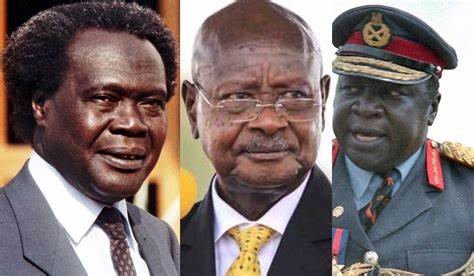Uganda’s political landscape has been marred by a series of betrayals, dictatorships, and authoritarian rule that have left the nation on its knees. From the moment Uganda gained independence from British colonial rule in 1962, the country’s leaders have proven themselves as nothing more than opportunists, prioritizing their own power over the well-being of the citizens they claim to represent. The so-called “progress” Uganda has made is overshadowed by the power-hungry moves of every leader who has come into office, particularly under the iron fist of Yoweri Museveni, whose decades-long rule has stunted the nation’s potential and buried any hope for true democracy.
At independence, Uganda’s first Prime Minister, Milton Obote, portrayed himself as a unifier. However, it quickly became evident that his vision for Uganda was a fantasy. Ethnic divisions between the Buganda Kingdom and the central government under Obote reached a breaking point in 1966 when he launched an attack on the Kabaka’s palace, forcing the Buganda king, Mutesa II, into exile. Obote’s hunger for control led to the abolition of traditional kingdoms and the centralization of power under his authoritarian rule. Uganda’s early years, which could have been a time of unity and nation-building, became a period of division and autocratic governance.
But the darkest days were yet to come. In 1971, the infamous Idi Amin grabbed power through a military coup, bringing about one of the most ruthless regimes in modern African history. Amin’s reign from 1971 to 1979 was defined by unparalleled brutality, economic destruction, and a death toll that cannot be overlooked. Over 300,000 Ugandans were murdered under his dictatorship, as the country was thrown into an abyss of fear and chaos. Amin’s bizarre policies, including the expulsion of Uganda’s Asian community, plunged the economy into shambles and isolated Uganda internationally. His downfall in 1979, thanks to Tanzanian forces and Ugandan exiles, did little to bring about lasting change as the country once again slipped into political turmoil.
Following Amin’s ouster, Uganda descended into more chaos with the return of Milton Obote in 1980. The rigged elections that brought him back into power sparked widespread civil unrest and ignited the Ugandan Bush War. Led by Yoweri Museveni, the National Resistance Army (NRA) waged a bloody guerrilla war against Obote’s regime. Uganda’s population suffered immensely, trapped between a corrupt government and insurgent forces that left destruction in their wake. Obote’s second stint in power was so disastrous that his own military overthrew him in 1985, paving the way for Museveni to seize control in 1986.
Museveni’s ascent to power was hailed as a new beginning, but his grip on Uganda has only proven to be another chapter of the same political tragedy. What began with promises of stability and reform quickly devolved into yet another authoritarian regime. Museveni, now one of Africa’s longest-serving leaders, has repeatedly manipulated Uganda’s constitution to extend his rule. His removal of presidential term limits in 2005 and the elimination of the age limit for presidential candidates in 2017 are blatant examples of his desperate attempts to cling to power. Museveni’s regime has stifled any hopes for true democracy, ensuring that he stays in control at the expense of the country’s political future.
Opposition in Uganda has been met with violence, repression, and systemic intimidation. The rise of Robert Kyagulanyi, better known as Bobi Wine, symbolizes the growing frustration among Uganda’s youth who are tired of decades of corruption and dictatorship. The 2021 elections, marred by widespread violence and electoral fraud, further demonstrated Museveni’s fear of losing power. Human rights organizations have condemned the regime’s crackdown on the opposition, suppression of free speech, and use of military force to silence dissent. Under Museveni, Uganda has transformed into a police state, where any form of protest is met with brute force and citizens live in fear of speaking out.
Uganda’s political journey is one defined by missed opportunities, betrayals, and iron-fisted rule. From the disastrous leadership of Obote and the brutal dictatorship of Amin to the current authoritarian reign of Museveni, the country has been trapped in a cycle of power grabs and repression. Instead of the democracy Ugandans deserve, they have been subjected to decades of self-serving rulers who only seek to perpetuate their own rule. As Uganda looks to the future, the path to true political reform remains treacherous, as long as men like Museveni continue to cling to power at the expense of the nation’s progress.







Discussion about this post